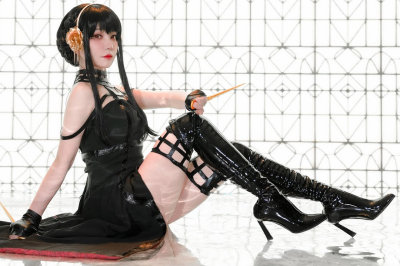A MIGHTY WIND FEATURE with CHRISTOPHER GUEST, EUGENE LEVY, CATHERINE O'HARA and HARRY SHEARER
The SPINAL TAP team are back and this time they're focussing their satirical eye on the world of folk music. Christopher Guest, who directs the folk comeback artists as well as starring as one of them (Alan Barrows), reveals, "It's all improvised, every word, and we have 80 hours on film of this. The process is [always] the same. Eugene (Levy, co-writer and Mitch in the film) and I worked for a period of months to figure out the story and the back history for all the characters, and the songs were written prior to making the film. Every scene is structured so we know what happens in each one, but there's no dialogue written, and no rehearsal. We only shoot for 26 days, so it's not a question of luxury, a lot happens in one day. On a typical conventional movie shoot they maybe get through 3 pages of script in a day, we'll get through 20."
Phew. Sounds exhausting.
"But it has to be a team effort. There's no competitive aspect to it, if there was we wouldn't be able to do this kind of work. Eugene and I sit in an office and we talk about it and it becomes apparent quickly who would be good for what part, [so] the parts are generally conceived with those actors in mind, and there are not many actors that can do this kind of work. That's why so many of them have been in these last 3 films."
"I haven't done a lot of singing in my career," says Levy. "I did a little folk singing in the 60s. The first public appearance I made was in front of an audience in the first year of high school in a singing group because my brother was in it. They were really great. I thought: Wow! This is neat! So I formed a singing group myself. Eventually I got into skits and comedy and stuff like that. But I couldn't make a living doing it - I've got a musical ear and I can carry a tune but the idea in this movie was to do the concert at the end which we were told would be done live. This put a little added pressure on to what I thought was a relatively good singing voice, the fact that we were supposed to be playing professional folk singers who had many hit records took a little work for me, and I think I can speak for Catherine as well, as two of the non-musician people. It was exciting but scary!"
"I think he's being a little modest!" adds Chris. "He has a wonderful singing voice and he's a talented musician. I couldn't have gone into this film arbitrarily assigning people these roles if I knew they weren't musical. When I did BEST IN SHOW, we were editing one of the reels when we heard some of them singing, it was just a left over bit of footage. It turns out that during a break this is what they'd been doing. I found out Michael Higgins (Terry Bohner in A MIGHTY WIND) had arranged it. It was an amazing arrangement. It gave me a lot of impetus to go into this film knowing that they could do this. And Michael arranges all the vocals for the Main Street Singers [in the film]."
Catherine O' Hara explains the hilarious lyrics for her catheter song towards the end of the film. "Jim Piddock, who plays my husband Leonard, had a catalogue of medical supplies. There was this show at the end of the movie and Chris said I would be singing for my husband wares, so Jim loaned me this catalogue. I asked Chris if I could write the song and he made me feel that I could. So I went through this catalogue and all these things are real. I wish for none of you to know these personally, but buttock straightener and penis clamper are real products Leonard would be selling, so I sang about them very seriously and I tried to make the music as pretty as possible."
Harry Shearer adds "[In Chris' films] you as the actor have a great deal of involvement in your character from start to finish. Unlike a normal movie where you arrive and your wardrobe etc. is all sorted out for you. In these movies you're invited to come in and talk with wardrobe people and decide what your character would wear in every scene."
Guest denies that the film mocks folk music: "We weren't mocking it. This music is a specific kind of folk music. I played this kind of folk as a kid but it was real folk as opposed to the commercialised version. We needed to write songs that were enjoyable for people to listen to [while] watching the movie and that were fun to play for the musicians. We've now been doing a tour of the States of all the bands in the film and it's fun to play these songs, they're engaging in some way. What happens after this, I don't know. We've sold a few CDs off this though!"
"I feel proud when people tell us how much they love the CDs," adds O'Hara, "because there are a lot of songs on the CDs that are not in the movie; and I wish you weren't ashamed and that you like it!"
"There's probably a group you can go to that'll work that out for you!" suggests Guest.
Ok, so if they really do enjoy folk music, what music do they really hate?
"I have that ventriloquist record," ponders Guest. "But then there's skate rink organ music."
"The easy answer to that is polka music," cuts in Shearer.
"There's a lot of exciting polka music," deadpans Levy.
"I agree," says Shearer to Guest, "Organ music at a baseball game or a hockey game is really worse than elevator music - it's about as low as you can get."
With all this goofing going on, on set and off, there must be millions of outtakes. But Guest says "There are times when we make each other laugh, but there's no outtakes as there are in other movies. There are whole scenes on the DVD which don't fit in the movie which are really funny but are not right in the context of the story we needed to tell. There are no outtakes in the traditional sense though I guess.
"We all have a great creative investment in films like this whether because we've written songs in it or decided the look of the characters - all of the impulses are running in the opposite direction - in the scene you're only thinking about what the character is thinking about in terms of what's going on in that scene. There's no prankish impulse going on behind that, there's only a few opportunities to get this right. Nobody is going to succeed by sabotaging their role."
"And that's not going to make it funny," cuts in Shearer.
O'Hara says "I think Chris is like a really good parent who lets the child fly free but guides them so you feel like you've come up with everything yourself even though you're being guided by this script. But the dialogue's all improvised and you have so much freedom in developing your character. And Chris basically never says no. He rarely says cut, he says "roll out!" maybe [he'll call for] another take, maybe not but the dialogue will change. Sometimes you want to keep a particular line in, but it's fresh every time. The beautiful thing that Chris does is make you feel like you can do no wrong."
But, perhaps the biggest test of all was the reaction of the folk world in the States.
"There's a kind of folk world in the states, every city has folk clubs, but there's no real folk establishment," says Guest. "It doesn't represent anything in the industry in terms of record sales. It's not as it was in the 60s when it represented the peak of what was happening in recording. It's nothing like that now, it's more on the fringes."
"I get a lot of e-mail [about this] because I do a radio show," adds Shearer. People were setting up folk chat boards and wondering whether this movie would be good for them or not - and then someone saw a preview and said oh we can relax, it's not about us. A friend of mine attending the screening said "It makes my skin crawl - in a good way."
"I would love to do the show at the Royal Festival Hall," muses Shearer. "I haven't had as much fun in my life as doing the show with these guys. I spend two-thirds of the show watching the others and I have best seats in the house for that and then it's amazing because we get to play too. Chris is more laissez faire with the live shows and it's amazing what people bring in and how the stories of all the characters are moved along. But we all go from where we left you when the movie ended."
Where on earth did Levy dig up his character of Mitch?
"It wasn't modelled after any one person, it wasn't modelled after Ozzy or Brian Wilson, although I can see the similarity, but it really wasn't. We creatively did the back story for this guy and the closer we got to shooting I was getting more nervous that we'd painted such a picture of this man who'd lost everything and was so sedated on drugs [that I was thinking] what is this man going to be like?
"I modelled the voice patterns after a guy I knew growing up in my home town of Hamilton, Canada, he was kind of a clerical guy."
And on that note, watch out for the folk fanatics at a concert hall near you.



